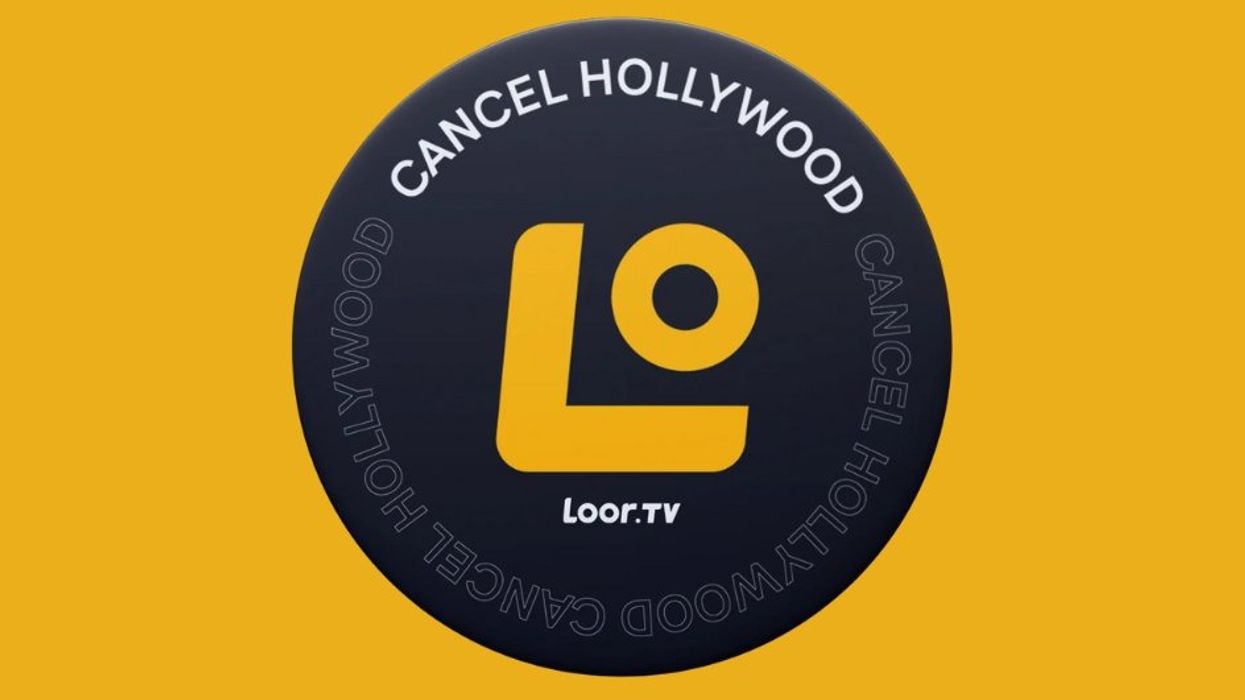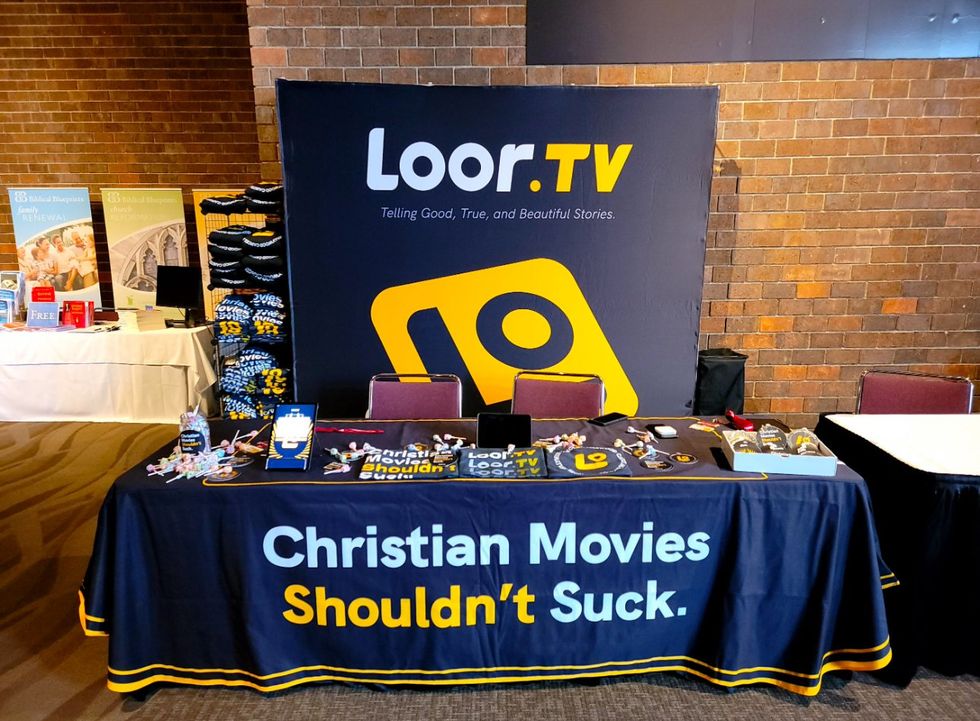
© 2025 Blaze Media LLC. All rights reserved.
Upstart streamer Loor.TV is out to televise the conservative revolution
December 17, 2024
Founder Marcus Pittman on creating what young male viewers want to watch — and why Christian movies don't have to suck.
One of entrepreneur Marcus Pittman’s biggest inspirations these days is Trump.
Barron Trump, to be precise.
'What happens if you combine funding and distribution on the same platform and you target it towards younger viewers?'
With his streaming startup, Loor.TV, Pittman’s betting on an audience conservative media usually ignores: young men. And after watching Barron help the senior Trump retake the White House, Pittman’s even more confident his instincts are correct.
Bet on Barron
“If you look back at MTV, Cartoon Network, Nickelodeon, basically every major cable TV brand, they all [catered] to a young male audience,” Pittman tells Align. It’s an audience that conservatives seem to have written off as a lost cause.
“We as conservatives have [said], ‘They don't serve us, and they don't have any money,’” says Pittman. “But actually they’re very engaged. And I think Barron knew that.”

Which is why the 18-year-old scion convinced his 78-year-old dad to hit the podcast circuit in the final months of the election, sitting down for lengthy but casual talks with Gen Z favorites like Joe Rogan, Theo Von, and Logan Paul.
If you’re over a certain age, chances are the only one you recognize from that list is Rogan — even though all are huge cultural and commercial forces. Take Adin Ross, the 23-year-old online streamer who interviewed Trump live in August.
“He signed what’s rumored to be $100 million to stream on Kick,” says Pittman. “That’s Joe Rogan numbers, but most people haven’t heard about [him].”
Ross arrived at the interview in what turned out to be a gift for the candidate: a customized Tesla Cybertruck, emblazoned with the now-iconic image of Trump in the immediate aftermath of his assassination attempt, fist raised in defiance.
To Pittman’s eyes, the stream’s success was a “tremendous moment” for the young male demographic — and a kind of proof of concept for Loor.
“I don't think it's that they don't vote. I just don't think they ever have content catered to them,” he says. “I’ve described it as: We’ve built all these stores, and all they sell is Depends. And we wonder why young people aren’t buying.”
Breaking in
As an outsider who’s managed to barge his way into the conservative media-sphere, Pittman has come by his conclusions honestly.
Almost exactly 12 years ago, the then-unknown filmed an anti-abortion protester holding a sign reading “Babies Are Murdered Here” outside a Planned Parenthood clinic. That clip became the catalyst for Pittman’s 2014 documentary of the same name.
Reception from the pro-life movement was surprisingly chilly, Pittman recalls. “The gatekeepers hated it,” he posted recently on LinkedIn. “No [prominent evangelicals] would share or promote the film ... but because of the freedom of the internet, it went crazy.”
Pittman hadn’t realized it, but apparently calling abortion “murder” was beyond the pale. “Abby Johnson even threatened to call the FBI on me.”
And yet “Babies Are Murdered Here” found an audience — and helped reframe the abortion debate. Says Pittman, “The radical freedom of the internet, even with all the dangers and filth, ultimately winds up pushing cultural narratives towards what's true.”

No country for young men
The success of “Babies Are Murdered Here” led to an opportunity to co-found Apologia Studios, an evangelical podcast network based in Arizona. After a successful, five-year run as Apologia’s studio director, Pittman took a job as head of video advertising at Scottsdale-based Social Ally.
One of the agency’s clients was Christian streaming service Pure Flix (now known as Great American Pure Flix). Immersion in the Christian film industry made Pittman realize the extent to which young audiences were being ignored in favor of mostly older women.
“And so I left and made another movie,” says Pittman.
That movie was 2019’s “Babies Are Still Murdered Here.” Pittman made the sequel available on Amazon Prime, which abruptly pulled it after seven months, despite overwhelmingly positive reviews.
That experience was eye-opening, says Pittman. “[I thought] there's a real problem here because we have a lack of funding and a lack of distribution support for any content that's outside of a very narrow window.”
To remedy that, Pittman founded Loor in late 2020. The pitch was simple: “What happens if you combine funding and distribution on the same platform and you target it towards younger viewers?”
Making loot
Like many a streaming site, Loor offers its subscribers access to its content for a monthly fee. Where Loor departs from the usual model is that every show or movie on the site is at some stage of funding.
Subscribers themselves provide this funding; every month they receive an amount of free Loor currency called loot, which they can use to help support projects they like. In the event that they want to offer a project or projects even more support, they can buy additional loot from the site.
For younger viewers, accustomed to such micro-transactions from the video-game world, this kind of participation is a big perk.
“We’ve heard reports that some kids were so excited about [Loor animated children’s show] ‘Bearly Biblical’ that they asked their dad if they could mow the lawn to raise money to fund the next episode of the cartoon. And they did,” recounts Pittman.
Slaying Goliath

Created by longtime animator Tim Ingle, “Bearly Biblical” uses cartoon teddy bears to re-enact the most violent stories from the Old Testament. Pittman sees it as both educational and an entertaining throwback to “the way cartoons used to be ... when Elmer Fudd had a shotgun and the Teenage Mutant Ninja Turtles used actual weapons to fight enemies.”
Other shows on the site include “Esotera,” an ambitious, post-apocalyptic sci-fi epic; “Gothix,” a documentary about a popular streamer’s departure from liberal orthodoxy and subsequent cancellation; and “Felt Board Sunday School,” a “South Park”-style animated show spoofing “church lady” culture.
The first episode of “Bearly Biblical” portrays a plucky young Israelite shepherd named David literally knocking the stuffing out of Philistine giant Goliath. That classic story very much resonates with Loor’s mission.
“You don't need the strongest weapons,” says Pittman. “You just need to be able to take the most shots. And it only took David one, but he brought five stones.”
Pittman continues: “I would much rather have 100 filmmakers [take a chance with] $10,000 than put $30 million into one thing that's got to work.”
By offering creators a platform to take such chances, Pittman wants to create a much-needed incubator for new talent.
To innovate, incubate
“When we first started, people said you're going to need $100 million just to get this off the ground,” says Pittman, citing the widespread assumption about what it takes to compete with behemoths like Netflix or Disney.

“I like to make the comparison that everybody's trying to buy a major league sports team, but nobody’s built out the college [pipeline] for talent yet,” says Pittman. “That's why we use the same [canceled, conservative] actors in everything. Because we don't have a way to say, ‘Have you seen the film that kid made for $10,000?’ And then build that kid up by slowly giving him more money for every project he does.”
People in the mainstream media have begun to take notice. After hearing Pittman talk about Loor on a podcast, veteran industry executive and Fuel TV co-creator Shon Tomlin reached out. “This is the first time in 25 years where I heard someone [who made me say], ‘This guy understands entertainment, pop culture, comedy, animation, technology, gaming, monetization, streaming,’” he would later recall. Tomlin joined the company in September.
As Loor grows, catering to the young male audience remains central to its plan. When I mention how much my 11-year-old son seems to prefer watching YouTube shorts to TV, Pittman counters that this doesn’t mean that younger viewers lack the attention span for long-form entertainment.
“That’s not true. Podcasts [can be] multiple hours long and still get views in the millions,” he says, adding that the algorithms guiding tech companies like YouTube and TikTok tend to promote short-form content.
No one's really tried to make long-form content for this generation. But if you look at "'Deadpool vs. Wolverine’ or ‘Top Gun,’ they're all for that younger male audience. All the hits are. And that's what wins the movie theater: younger male content.”
After years of being called crazy for bucking the conventional wisdom, Pittman intends for Loor to spearhead that victory. “If you think long-form podcasts are great, wait until we [win] narrative art and storytelling. We’ve owned the podcasts/talk radio side for a while. But once conservatives own both, we’ll be unstoppable.”
Want to leave a tip?
We answer to you. Help keep our content free of advertisers and big tech censorship by leaving a tip today.
Want to join the conversation?
Already a subscriber?
Managing Editor, Align
Matt Himes is the managing editor for Align.
matthimes
more stories
© 2025 Blaze Media LLC. All rights reserved.
Get the stories that matter most delivered directly to your inbox.
By signing up, you agree to our Privacy Policy and Terms of Use, and agree to receive content that may sometimes include advertisements. You may opt out at any time.



